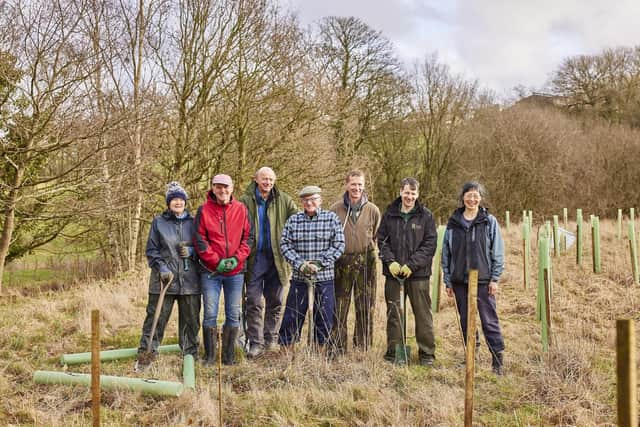Lancashire gets a new woodland: volunteers plant 4,200 trees in less than two months - here's why
and live on Freeview channel 276
Since the start of the year, volunteers have spent more than 400 hours planting 4,200 native UK trees including alder, hazel, hawthorn, holly, sessile oak, common oak, downy birch, wild cherry, and goat willow at a site in Samlesbury, near the River Darwen.
The project is the result of a partnership between United Utilities and the Ribble Rivers Trusts which aims to reduce the run-off of soil and nutrients into waterways by planting more than 11,000 new trees in Lancashire.
Advertisement
Hide AdAdvertisement
Hide AdFunded by United Utilities, the Ribble Rivers Trust is creating new woodlands at Sabden, Samlesbury, and the Forest of Bowland – the site at Blue Slate, Samlesbury is the first.


Why do it?
The woodlands have been created to help tackle the run off of phosphates – a nutrient which is harmful to river health. The new trees will also provide shade and shelter for watercourses, homes for wildlife and help to mitigate flood risk.
Both the Ribble Rivers Trust and United Utilities are closely observing the sites to assess the effect the tree planting has on water quality. Before and after data is being gathered to enable the health of the rivers to be monitored and the benefits created by the woodlands to be better understood.
This will help both organisations develop future strategies for tree planting and whether it can be scaled up to deliver large scale, catchment-wide benefits to water quality and the wider environment.
Advertisement
Hide AdAdvertisement
Hide Ad"Incredible”
James Airton, Natural Capital Strategy and Planning Manager for United Utilities said: “It’s great to see the first new woodland already planted, for the volunteers to plant more than 4,000 so quickly is incredible.
“While United Utilities continues to invest in its infrastructure, we are also keen to explore nature-based solutions as an alternative to concrete and pipes. Teaming up with partners such as the Ribble Rivers Trust means we can work together to develop effective solutions for the future.”
Jack Spees of Ribble Rivers Trust said that as well as removing phosphates, there were early indication that there are also additional secondary benefits, with surveys showing rapid increases in the diversity and number of freshwater insects, a clear indicator of improving river health.